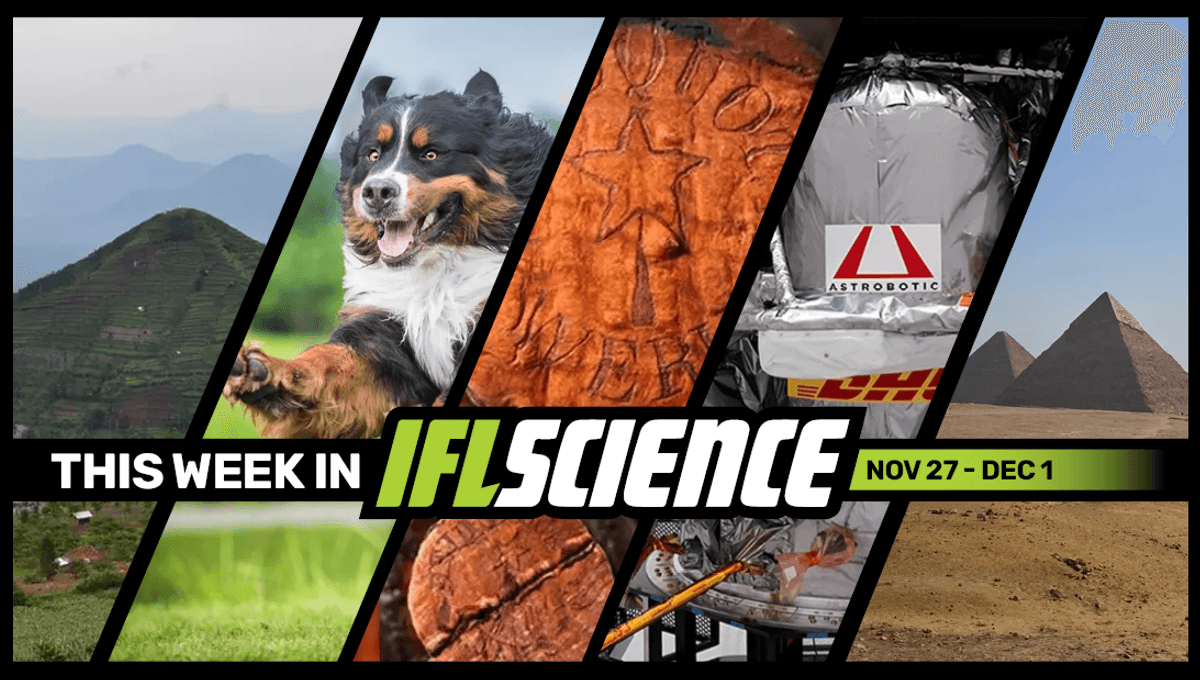
This week 170-year-old champagne found on a shipwreck is the oldest ever tasted, for the first time in 50 years, the US plans to land on the moon next month, and a discovery of ancient Egyptian waterways hints at how the pyramids may have been built. Finally, we explore if humans will settle in space anytime soon.
Subscribe to the IFLScience newsletter for all the biggest science news delivered straight to your inbox every Wednesday and Saturday.
The 25,000-Year-Old “Pyramid” In Indonesia Was Likely Not Made By Humans
Last month, a new study garnered a lot of media attention (including from IFLScience) for its extraordinary claim that a mountain in Indonesia is actually the world’s oldest pyramid built by ancient humans. But reactions from archaeologists since have raised skepticism about its bold conclusions. Read the full story here
Life-Extending Drug For Big Dogs Moves One Step Closer To FDA Approval
This week, biotech company Loyal announced that it had reached a key milestone in the path toward approval of its lifespan-extending drug for dogs. The announcement came after the US Food and Drug Administration (FDA) Center for Veterinary Medicine confirmed they were satisfied that the drug, LOY-001, is likely to be effective at increasing the lifespan of large dogs. Read the full story here
170-Year-Old Shipwreck Champagne Is Oldest Ever Tasted, With Notes Of “Animal” And “Wet Hair”
The idea of finding a treasure chest in an ancient shipwreck might be a popular movie storyline, but far from gold and jewels, an unexpected new item might be the source of future wealth. A group of divers discovered a shipwreck containing 168 bottles of champagne that were still intact, so, of course, they tasted it. Read the full story here
Surprise: After 50 Years, US To Land On The Moon Next Month
With over half a century since NASA last landed on the Moon, the upcoming Artemis missions are a source of global excitement. However, before the crewed launch (fingers tightly crossed) in November 2024, the US will actually return to the Moon’s surface next month, hitching a lift aboard a private company’s lander on January 25. Read the full story here
Discovery Of Ancient Waterway May Solve Mystery Of How The Pyramids Were Built
The mystery of how the pyramids were built may have finally been solved thanks to the discovery of an ancient branch of the Nile that once flowed through Giza. Hundreds of meters wide, the enormous waterway has long since dried up, but could have provided transportation for the colossal amounts of material and workers needed to construct the iconic landmarks thousands of years ago. Read the full story here
TWIS is published weekly on our Linkedin page, join us there for even more content.
Feature of the week:
Can We Settle Space Anytime Soon?
In the late 1950s, humanity took its first shaky steps into the cosmos. In the last few decades, we have had a continuous human presence living in Earth orbit, and we expect this to continue for the foreseeable future. In this exclusive interview, we spoke to A City on Mars authors Zach and Kelly Weinersmith about whether humanity can settle in space – and if we should. Read the full story here
More content:
Have you seen our free e-magazine, CURIOUS? December 2023 is OUT NOW. Check it out for exclusive interviews, book excerpts, long reads, and more.
PLUS, check out season 3 of IFLScience’s The Big Questions Podcast, in which we asked:
• How Is Climate Change Affecting Polar Bear Populations?
• Why Is Space Junk Such A Big Deal?
• Can We Save A Species On The Very Brink Of Extinction?
• How Does A Quantum Computer Work And How Will They Change The World?
• What Is Space Weather And How Does It Affect Us?
• What Is Ancient Ice Telling Us About The Future?
• Are E-Fuels The Future Of Aviation?
• How Are Glaciers Changing In A Warming World?
• Are We Ready For The Next Massive Solar Flare?
Source Link: This 25,000-Year-Old “Pyramid” Was Likely Not Built By Humans, Life-Extending Drug For Big Dogs Gets Closer To FDA Approval, And Much More This Week